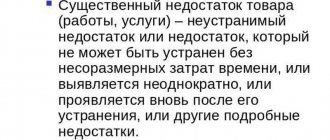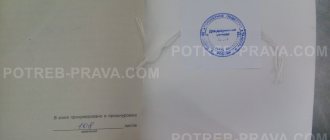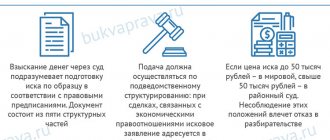Home / Complaints, courts, consumer rights / Consumer rights
Back
Published: 08/30/2018
Reading time: 5 min
2
416
After purchasing a product, the buyer may want to return it for a number of reasons. According to the general rule established by Russian legislation, this procedure can be carried out within 14 days after purchase.
- Exchange and return of goods: what does the law say?
- What goods cannot be returned?
- How to return goods and money?
However, there are a number of exceptions. For some categories of items, replacement and return are not possible.
What by-laws regulate this issue?
The list of goods that cannot be returned or exchanged is enshrined in the Federal Law “On the Protection of Consumer Rights”. Thanks to it, the consumer, relying on Article 502 of the Civil Code of the Russian Federation and Article 25 of the OZPP Law, has the right to exchange goods whose quality does not suit him. The meaning of these two legal acts boils down to the following: citizens have the opportunity to return or exchange a product (if the seller has a similar one) within 14 days from the date of purchase (but the day of purchase itself is not taken into account in this time period).
Goods that cannot be returned are listed in No. 55 of the PRF, dated January 19, 1998. This list is complete; sellers do not have the right to independently change it, add additional items or delete a number of products from it. It is quite difficult to replace or return food products; the seller independently makes the decision on the assignment.
The nuances of exchanging high-quality non-food goods
Consumers should note that exchanges in accordance with Art. 25 The purchase order is made at the same seller where it was originally purchased, but it is not indicated that this necessarily occurs at the place of purchase. That is, the replacement may take place in another location specified by the seller.
The buyer can exercise his right within 14 days, but the day of purchase of the goods is not included in this period. The possibility of exchange appears if the product does not suit the style, configuration, color, size and dimensions, shape, that is, according to formal characteristics. Since the law does not indicate a special procedure for calculating deadlines, the general one established by Art. 191 Civil Code of the Russian Federation. This means that the speech in Art. 25 refers to calendar days, that is, the right to exchange can be exercised within two weeks.
The presence of a receipt (sales or cash receipt) is not a prerequisite for proving the purchase of goods from a specific seller. In this case, there remains a legal opportunity to refer to witness testimony, but usually the absence of a receipt is the basis for the seller’s refusal to replace the purchased item.
How to find out which items cannot be returned
Sometimes the store still has the right to refuse a refund. This can happen due to the fact that the product is on the list established by Decree of the Government of the Russian Federation No. 55 of January 19, 1998. It contains a complete list of non-food products that cannot be returned to the store after a thoughtless purchase. It is worth adding that in some cases the store is obliged to accept even goods from the list, but this is the exception rather than the rule. It is enough to refer to this document to understand whether the refusal to return is legal or not. Store administrations do not have the right to further establish restrictions on returns; such decisions are made only by the Government of the Russian Federation.
Can personal care products be returned?
According to Article No. 25, the buyer has the opportunity to replace or return goods of the wrong size, color, cut, shape or dimensions within up to 14 calendar days. However, this provision is only valid for certain product categories. Generally, items eligible for return include clothing and shoes worn for trying on only.
Attention
You can return a personal care product for a refund only if a defect is discovered that prevents its proper use. Products of proper quality cannot be exchanged in the store.
The restriction on returns is due to the fact that personal hygiene items are used strictly individually and cannot be returned for sale after the buyer refuses. If the buyer did not use the product, then this fact is in most cases difficult to prove.
Maintained integrity of the packaging is not a sufficient condition for a return, as this is not prescribed by law.
Additional Information
One of the most common disputes arises over shaving cartridges, which the buyer wants to return to the store in a sealed blister. Despite the complete safety of the packaging, presentation of the item and the obvious fact that the product has not been used, the store has the right to refuse.
There are no clear definitions of proper and improper product quality in the law. However, legislators implied that the product was of adequate quality in the absence of any defects. According to the law, a defect in a product is considered to be its non-conformity:
- mandatory requirements of the legislation of the Russian Federation;
- requirements of the purchase and sale agreement;
- intended use by the manufacturer;
- the purposes that the buyer communicated to the seller upon purchase;
- the description or sample presented in the store.
If the defect of a product cannot be eliminated, appears again after repair, requires significant costs and a long time to eliminate, then it is called a significant defect.
In the case of personal hygiene products, the most common cases of purchasing products that have expired, which is clearly a disadvantage of the product. Expired personal hygiene items must be immediately returned to the store or exchanged for a similar product.
List of food products that cannot be returned
The list is not so long, but it will not be superfluous to know it. Products that cannot be returned or exchanged 2020, the list is approved by the relevant government document:
- Products of plant origin. this included cereals, pasta, vegetables - both fresh and frozen, mushrooms, sugar.
- Products of animal origin - dairy products, fish, eggs - cannot be returned.
- Mixed origin - oil, fats, margarine, mayonnaise, coffee, tea, seasonings, spices, drinks - non-alcoholic and alcoholic.
This is also important to know:
What is the warranty period and how long does it last?
But here, too, there are exceptions. This product can be returned, but if there are gross violations on the part of the retail outlet or manufacturer, for example:
- the appearance of the product is of abnormal quality, and it was impossible to see this before opening the package - weathered sausage, dried cheese.
- the product does not meet the standards of proper quality for products - garbage in the tea, rotten product.
- expired.
If there are all these violations, do not hesitate to contact the retail outlet, you are required to return and refund the money for the low-quality product.
Free legal consultation We will answer your question in 5 minutes!
Ask a Question
Free legal consultation
We will answer your question in 5 minutes!
Ask a Question
For mouth and teeth
Personal care products that cannot be returned or exchanged are varied. The next fairly large category is oral and dental care products.
This can include:
- pastes;
- dentifrice;
- dental floss;
- rinse aids;
- toothbrushes;
- toothpicks.
Nothing difficult or unclear. Often people do not even think about returning or exchanging the listed products. The exception is cases in which a person bought a low-quality product. Let's say it's expired.
List of “non-food” goods that are not subject to return or exchange
Items classified as “non-food” can be returned, but only those that are not included in the list of non-returnable items. Resolution N55 of January 19, 1998 established the following list of products that cannot be returned even within 14 days (again, provided that they are of high quality):
- cosmetics and perfumes;
- personal hygiene items (combs, toothbrushes, etc.);
- cut textile products;
- furniture;
- jewelry products;
- printed publications;
- animals and plants;
- finishing materials sold by the meter;
- hosiery;
- knitwear (including towels and bedding);
- containers for storing food products;
- household chemicals;
- wires, cables and other similar products, measured in linear meters;
- cars, ships, trailers;
- civilian weapons and ammunition;
- technically complex devices with a certain warranty period.
What to follow
The list of goods that interest us that are not subject to return and exchange for 2020, as previously approved by Decree of the Government of the Russian Federation of January 19, 1998 No. 55 (as amended in 2016).
The specified list of goods that are not subject to return and exchange according to the law of the Russian Federation in 2020 includes only non-food products of proper quality. They cannot be returned or exchanged for similar products from others:
- size;
- forms;
- dimensions;
- style;
- colors;
- configurations
The government list of non-food products that are not subject to return or exchange consists of 14 consolidated items. All of them are presented below.
| № | Types of non-returnable goods |
| 1 | Products for the prevention and treatment of diseases at home:
Medicines |
| 2 | Personal hygiene items:
|
| 3 | Perfumes and cosmetics |
| 4 | Textiles: cotton, linen, silk, wool and synthetic fabrics; goods made from nonwoven materials such as fabrics - ribbons, braid, lace, etc. Cable products: wires, cords, cables) Construction and finishing materials: linoleum, film, carpeting, etc. Other goods sold by the meter |
| 5 | Sewing and knitwear: linen, hosiery |
| 6 | Products and materials made entirely or partially from polymers and in contact with food products:
|
| 7 | Household chemicals Pesticides Agrochemicals |
| 8 | Household furniture: furniture sets and sets |
| 9 | Jewelry and other products made of precious metals and/or precious stones Cut gemstones |
| 10 | Cars and motorbikes Trailers and numbered units for them Mobile means of small-scale mechanization of agricultural work Pleasure boats Other household watercraft |
| 11 | Technically complex household products (see below) |
| 12 | Civilian weapons Main parts of civilian and service firearms Ammo for it |
| 13 | Animals and plants |
| 14 | Non-periodic publications:
|
If the product was sold to you remotely (for example, via the Internet), then the above list does not apply. This conclusion follows from the letter of Rospotrebnadzor dated October 7, 2016 No. 01/13541-16-29 “On the legal basis for regulating distance selling.”
Hygiene and personal use
So, the first category is personal hygiene and personal use items. For example, this, as already mentioned, includes toothpaste and a brush. A variety of curlers, combs, hairpins, hair brooches, wigs and other similar products - all this is not subject to return or exchange. The exception is the discovery of defective products. But proving it will be very problematic. Therefore, as practice shows, it is impossible to return such products. And exchange too. Especially if it was used by the buyer. What products cannot be exchanged or returned? Here are a few more very common things that are found in stores and are not exchanged:
- shaving foam and lotion;
- shampoos;
- soap;
- bubble bath;
- bath salt;
- diapers;
- creams;
- shower gels.
This is also important to know:
How to properly return medical goods under the consumer protection law
In fact, all of these are bath accessories designed to care for human skin.
For hair
Now let's try to be a little more specific. Personal hygiene products that cannot be exchanged or returned will be considered below. Let's start with hair care products.
This may include:
- combs;
- combs;
- shampoos;
- rinse aids;
- paints;
- balms;
- mousses;
- foam;
- sprays;
- masks;
- combing liquids;
- oils (restorative and not only).
All this cannot be returned to the store. According to the Law “On Consumer Rights”, non-food products of good quality belonging to the category under study cannot be exchanged or given back. Accordingly, before buying something, it is better to think carefully several times.

Discounted goods
A discounted product is one for which the seller set a price lower than the original price . In this case, the buyer is not required to know the reasons for the markdown. Discounts have the same principle of action on the part of the seller and are analogous to markdowns.
The seller retains the right to set the price of the product and change it at his own discretion. It may decrease due to commercial reasons driving the store, or if any defect is discovered .
In the event that the price of a product is reduced due to the presence of defects, the seller must inform the buyer about the existing defects .
Then the transaction will be legally clear, the buyer will not be able to demand an exchange or return based on flaws that he was notified about in advance. However, if defects other than those agreed upon in advance are discovered, the consumer can exercise his rights.
In this case, the seller is obliged to replace the goods or return funds to the buyer .
The fact that the product was sold at a discount or markdown is not an argument for refusal. But the seller has grounds to demand compensation for the examination if it turns out that the defect appeared due to the fault of the buyer, and not the store or the manufacturer’s company.
Before attempting to return your purchase:
- Know your civil rights as well as your consumer rights. Many stores rely on little awareness among their customers;
- Check to see if your item is on the "non-return" list. If yes, then you can return or replace it only if the quality is poor. This is stipulated by the Law.
If the seller refuses to examine the defective product or the results of the procedure seem doubtful to you , you can order your own examination with the involvement of third parties . If you are right, the seller will be obliged to reimburse you for the cost of the examination . However, if your error was discovered when resolving the issue on the part of the store, you will have to pay for the examination.
This is also important to know:
Consumer rights to return goods: rules for returning goods to the store, return period
If a seller infringes on your consumer rights, feel free to contact the consumer rights committee or court .
Free legal consultation
We will answer your question in 5 minutes!
Free legal consultation We will answer your question in 5 minutes!
Call: 8 800 511-39-66
Ask a Question
Technically complex products that cannot be returned
The list of complex technical goods that cannot be returned is indeed only approximate. The complexity of a product is determined by the set of its functions and characteristics, its intended purpose and other factors. Resolution No. 55 includes in the list of goods that are not subject to return the following technically complex household products:
- electrical appliances and machines - refrigerators, televisions, washing machines, etc.;
- equipment intended for photography and filming;
- telephones and faxes;
- gas equipment used in everyday life;
- radio-electronic devices;
- other types of products with a complex structure and multifunctionality.
Note!
When selling goods, the seller is obliged to place information about the specified list in the public domain. Therefore, when purchasing, you can clarify whether the product falls under the list of goods that cannot be returned.
This list also contains one more requirement for complex technical products - they must be covered by warranty periods. The product's warranty period allows you to request repairs at the expense of the seller or manufacturer. Therefore, if a product was sold through a store without a warranty period, there are no restrictions on returns.
Intimate hygiene
Even all the previously listed products cannot generally describe all hygiene products that cannot be exchanged under any circumstances. Therefore, we will continue to study one or another of its classes.
Next in line are intimate hygiene products. They, oddly enough, cannot be exchanged or returned in Russia.
What is included in this list? Eg:
- liquid soap for intimate areas;
- creams;
- depilatories;
- gels.
All this can be found on the shelves of supermarkets and cosmetics stores. Some products are displayed in pharmacies. Regardless of where the product was purchased, it cannot be returned. This is the law.
Changes to the list and final provisions
The list of goods of good quality that cannot be exchanged or returned has not changed in 2020; in general, the amendments to this document were quite few. Major changes were made at the end of 1998; in 2020, jewelry was added to the list; in 2020, the list of technically complex goods and goods intended for storing and using food products was edited (clause 6).
When determining which goods cannot be returned within 14 days and when forming the corresponding list, the legislator used the term “non-food”, thus these restrictions do not apply to food products.
In practice, difficulties arise when classifying goods into one type or another, especially for technically complex goods. If you cannot reach an agreement with the seller, you should not be afraid of litigation. Numerous judicial practices in most regions of the Russian Federation, including St. Petersburg, Moscow, and the Moscow region, are on the consumer’s side. Especially if the consumer is represented in court by an experienced lawyer.
When the list doesn't work
The list of non-food products of good quality that cannot be returned or exchanged is a kind of exception. But they do not apply if the seller has not fulfilled the legal requirement to provide the buyer with information about the product (work, service). Here's what we're talking about:
- confirmation of compliance;
- properties and contraindications;
- real price;
- warranty period (if any);
- instructions for the correct use of the product;
- period of validity of consumer qualities and safety rules after;
- address and name of the manufacturer, importer;
- rules for selling goods;
- reflect if the item is used.
Please note that in this context, the law only protects the buyer. The seller is not entitled to any costs or compensation in connection with the exchange/return of goods. If you are not happy with something, go to court.
General provisions
According to the paragraphs of the Resolution, each trading establishment must have a journal for making comments, provided to the buyer upon request. If the sale of goods is subject to mandatory licensing, information about the license (number, validity period, name of the enterprise that issued it) is posted in places accessible for inspection. Also, to avoid incorrect weighing of products, the store must have check scales that are in working order and accessible to visitors.
Goods not subject to retail trade
Peddling means retail trade outside a store when the buyer is:
- Houses;
- At work;
- in an educational institution;
- in transport;
- on the street;
- other places.
Pass trade is prohibited:
- Grocery goods. The exceptions are the following products in manufacturer's packaging:
- bread, buns;
- confectionery;
- ice cream;
- drinks that do not contain alcohol.
- Medicines.
- Medical goods.
- Jewelry.
- Audio and video discs.
- Computer programs.
- Weapons and cartridges.
Information about goods provided to the consumer without fail
As 55 of the Decree on the Protection of Consumer Rights indicates, the seller must provide all the information about the product required to make the right choice when purchasing:
note
Article 8 of the Consumer Rights Protection Law describes in detail the buyer's right and the seller's obligation to provide information about the product. Additionally, the information must be in Russian, but notarization of the translation (if translation is necessary) is not mandatory. Read more in this article
- Product name.
- Information about the manufacturer:
- Name;
- address;
- country (for goods imported from abroad).
- The location of the company that accepts customer complaints and carries out repairs and maintenance of the product.
- Certificate of conformity according to the law on technical regulation.
- Consumer characteristics of the product.
- Energy-saving qualities, if the provision of such information is required by law.
- Operating rules implying long-term and safe use of the product.
- Warranty period (if available). About consumer rights during warranty repair of goods, read this article https://potrebexpert.online/6116-prava-potrebitelya-pri-garantiinom-remonte
- Expiration date, if applicable. After its expiration, the product may become unusable or pose a danger to the health and property of the consumer. In this case, the need for disposal of the product and the possible consequences if the instructions are not followed are indicated.
- The cost of the product is in rubles. When purchasing on credit - its value, the total amount to be paid and the payment schedule.
- Use of the product or elimination of existing deficiencies.
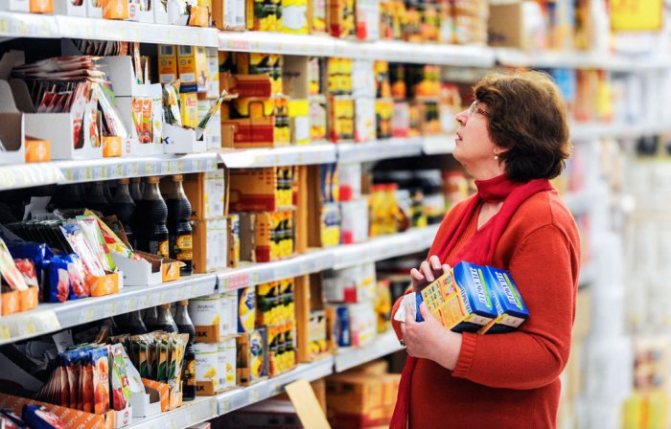
Return of purchase
If the purchased product is not on the list of items that cannot be returned, it can be returned to the store before 14 days have passed from the date of purchase. Or exchange for a similar product that has different:
- size;
- shape;
- style;
- color;
- complete set.
About the rules for returning goods to a store - read the article here
If the desired product is not in stock, the buyer can wait until it becomes available or return the purchase to the store and receive the money paid for it. Acceptance or replacement of a product is carried out if it:
- not used for its intended purpose;
- has a factory label, packaging, seal;
- has not undergone visual changes;
- has not lost its consumer qualities;
- accompanied by proof of purchase in this particular store.
Purchasing a product that has defects
According to Article 55 of the Law on the Protection of Consumer Rights, if after purchasing a product the buyer identifies defects in it that were not specified by the seller, he has the right:
- Return the product and receive the money paid for it. In this case, the seller does not have the right to recalculate the cost due to the use of the product, loss of its presentation and similar reasons.
- Exchange the product for a similar one without defects.
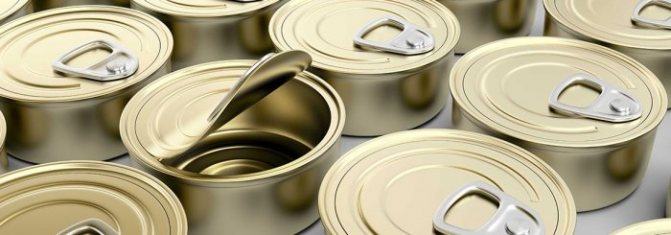
- Use a replacement for the same product, but of a different brand, receiving the difference in cost or paying the missing amount.
- Reduce the cost of the product in proportion to the identified deficiencies.
- Demand that the defect be eliminated at the seller's expense.
- Eliminate deficiencies at your own expense and receive compensation for expenses incurred.
- Receive compensation for losses incurred as a result of the purchase of low-quality goods (if any).
The consumer has the right to receive a similar product for free use during the repair or replacement of a purchased item. The exception is the goods listed in the List of this Resolution.
Exceptional cases of non-refund
Products not included in the list of prohibited returns to the seller cannot be transferred back to the store with a requirement to pay money to the buyer for the following reasons:
- color changes;
- if you don’t like the product or equipment because it’s not needed;
- when changing a style;
- when purchasing the wrong size;
- if the dimensions turned out to be unsuitable.
Also, the seller has the right to refuse the buyer if the characteristics of the returned product are severely deteriorated, it was used for other purposes, its integrity has been violated or damaged, repairs are required, factory seals have been broken and tags have been removed.
All food products, that is, those consumed as food, cannot be returned.
Sources:
- https://pravapot.ru/tovar/vozvrat-obmen/ne-podlezhashie-po-zakonu-perechen.html
- https://www.syl.ru/article/274607/new_kakie-tovaryi-ne-podlejat-obmenu-i-vozvratu-zakon-o-vozvrate-tovara
- https://potrebitel-expert.ru/vozvrat-i-obmen/kakie-tovary-ne-podlezhat-vozvratu-i-obmenu/
- https://pradialog.ru/vozvrat-i-obmen-tovara/kakie-tovary-ne-podlezhat-vozvratu/
- https://zaschita-prav.com/kakie-tovary-ne-podlezhat-vozvratu-i-obmenu-po-zakonu/
- https://takovzakon.ru/kakie-tovary-nadlezhashhego-kachestva-nelzja-vernut-v-techenie-14-dnej-spisok/
- https://buhguru.com/spravka-info/tovar-ne-podleg-vozvratu-i-obmenu-perechen-2018.html
- https://potrebprav.ru/info/tovari-ne-podlezhashhih-obmenu-i-vozvratu
- https://bukvaprava.ru/2018/05/17/kakie-tovary-ne-podlezhat-vozvratu/
Subscribe to the latest news


